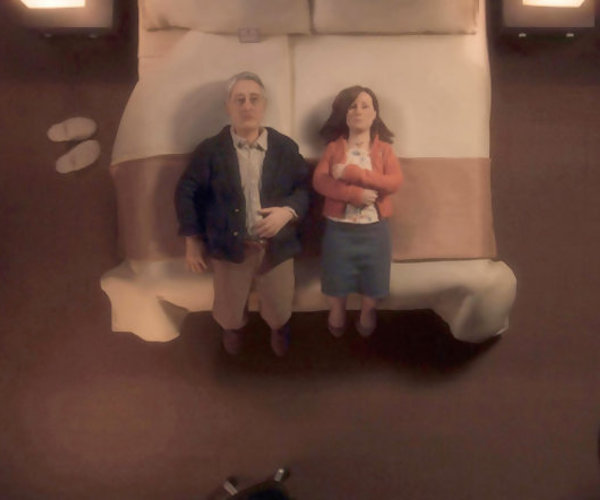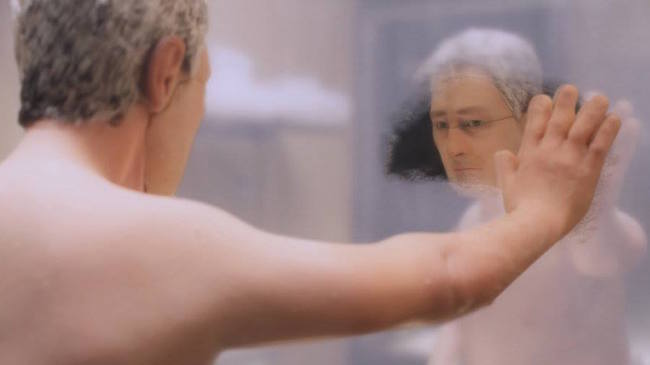Film Review: Hell is the Nervous Laughter of Tom Noonan — Charlie Kaufman’s Inscrutable “Anomalisa”
Charlie Kaufman crafts worlds where people find love in unlikely places, and lose love so easily you’d think they actually want to be miserable.
Anomalisa, directed by Duke Johnson and Charlie Kaufman.

A scene from “Anomalisa”– Stop-motion puppetry is a sort of cinematic version of a carnival funhouse.
By Peg Aloi
Charlie Kaufman’s approach to cinematic storytelling seems to involve crafting visions of unpleasant underworlds, inimitable versions of hell that are usually highly personal. In my personal hell, FYI, the radio plays nothing but polka music, Waffle House is the only restaurant, and every guy in my demographic dating pool has the voice of Tom Noonan; but that’s just me. Kaufman’s genius move of casting Noonan (an iconoclastic actor, to say the least) for every voice aside from his two leads is innovative and, frankly, terrifying. Kaufman knows what irritates and depresses us as if he has intimate knowledge of our deflated psyches. His films are full of dead-end careers, embarrassing encounters, irritating sounds, uncomfortable sex scenes, and a seemingly endless parade of sociopaths.
But the love. Love is a constant quest, and frequent disappointment. Themes of fate and destiny abound, along with an almost casual ennui borne of the belief that Nothing is Ever Really Going to Work Out, Is It? No wonder Kaufman invents worlds where you can switch bodies with a movie star in order to seduce your sexual obsession; or make your life into a live-action play that goes on for years while everyone but you notices how much you’ve aged; or erase the nasty memories of a soured love affair.
In his latest film, Kaufman pairs his sardonic wit with brilliantly-executed stop-motion animation by co-director Duke Johnson. The result is a haunting, often hilarious and ultimately moving account of a man’s struggle to find love and, maybe, himself. It may be an existential crisis, or perhaps the portrait of a narcissist. The nice thing about human drama rendered in puppetry this way is that it resonates deeply with viewers, complicating those pesky pangs of recognition and empathy. Our response to puppets in cinema is not unlike our response to clowns, masks, ventriloquist dummies, and talking animals: they are different enough from us to be safely in the realm of The Other, but similar enough to show us shadowy and sobering aspects of our humanity, if we choose to see them. Stop-motion puppetry is a sort of cinematic version of a carnival funhouse; things are distorted just enough that they bounce between alluring and terrifying, as the mirror ripples and reflects back who we think we see.
The film opens with a plane flying through clouds. A muted cacophony of voices seems to portray the plane’s passengers, pilot and automated announcements. There is something odd about the sound of these voices, but we’re not sure what it is. Michael Stone (voiced by David Thewlis) stares out the window, pops a pill, and reads over a letter from an angry ex-girlfriend who, in his memory, seems to speak with a man’s voice. As he exits the plane, he listens to his iPod which is playing Delibes’ “Lakme” sung by an odd, off-key male chorus. He hails a cab and arrives at his hotel, where everyone he encounters has the same square-jawed, round-eyed face, and their voices also sound eerily similar regardless of age or gender…hey, wait a minute. Wait a minute! WHY DOES EVERYONE SOUND LIKE TOM NOONAN?
Yes, the pilot who flew the plane, the cab driver, the hotel desk clerk, the bell hop, they all sound like Tom Noonan. So do Michael’s wife and son, who he calls briefly from his hotel room. So does the jilted ex-lover he phones after ten years of silence and invites to have a drink in the hotel bar. So does the guy who works in the sex shop Michael mistakes for a toy store, where he buys an antique Japanese doll for his son. “It’s pretty,” he says.
Michael seems depressed. Perhaps it’s because everyone he encounters speaks with the voice of Tom Noonan; or perhaps it’s because he has just arrived in Cincinnati. He’s the keynote speaker at a conference on customer service, about which he has written a best-selling book. After a brief but disastrous meeting with his ex-lover in the hotel bar, during which he explains his disappearing act a decade earlier by saying he thinks he has “psychological problems,” he goes back to his room and takes a shower. He stares at his face in the bathroom mirror, his facial muscles clicking robotically, and just as he seems about to reveal the metal gears beneath the flesh of his cheeks, he hears, as if it were radio static, a woman’s voice speaking nearby. “Someone else!” he exclaims and hurriedly throws on his clothes and runs into the hallway. He knocks frantically on doors and finally finds the voice’s owner: a conference attendee and customer service employee from Akron named Lisa. Her friend sharing her hotel room is Emily, a flirtatious blonde who has the same square-jawed face and Tom Noonan voice of everyone else in Michael’s world.

A scene from “Anomalisa.”
But Lisa…Lisa has a scar by her right eye that looks like a starburst, is socially awkward, and speaks without thinking, her gregarious outbursts usually followed by mumbled apologies. Michael is captivated by her voice (and why not? Jennifer Jason Leigh inhabits the role with fearless abandon) and invites the women for drinks. They all get pleasantly buzzed, and Michael hesitantly invites Lisa back to his room. She is shocked he’d choose her over Emily who is prettier and smarter. He continues to wax rhapsodic about her voice; “it’s magical!” he says. He cajoles her into singing for him, mesmerized by her rendition of “Girls Just Wanna Have Fun” in Italian (a cringeworthy but endearing moment).
They make love, in what is quite possibly the most realistic, and arguably the most tender, cinematic sex scene of the year (although I suspect some viewers won’t be able to avoid comparing the scene to the hilarious sex antics in Team America). Michael has a surreal nightmare that seems to embody the peculiar horror that continuously threatens to seep through the fabric of this film’s world: the notion that we have no sure way of knowing if we’re real, or alive, or in control of anything. This theme repeats when Michael gives his keynote speech, wandering from his script as he asks searching questions about the nature of reality. Lisa’s presence, her strangeness and newness, seem to temporarily shake him from his self-indulgent rut. But he ultimately seems unable to perceive the world or the people in it as individuals; trapped in his narcissism and self-loathing, he sees and hears only square-jawed, round-eyed people who speak with the ingratiating and, I have to say it, creepy, voice of Tom Noonan (sorry, Tom). Michael inhabits a hell of his own making, and can’t figure out how to leave, even when love seems to offer an escape route. Who among us has not felt trapped or paralyzed by our own comfy existence?
Charlie Kaufman crafts worlds where people find love in unlikely places, and lose love so easily you’d think they actually want to be miserable. In bringing these disturbing, mind-bending, romantic stories to the screen he has shifted the paradigms of cinema irrevocably. “Change your heart,” murmurs Beck during the end credits of Eternal Sunshine of the Spotless Mind, “look around you.” Anomalisa is a love story about learning to change our hearts by engaging our senses, beginning with listening. The story cajoles us, invites us: Listen! Listen, for there are strange melodies in the air. They can break through the dull din of daily life, past the pain, above those ingratiating inner voices that tell us (as in the final scene of Synechdoche, New York) that we’re all slowly dying. And look, look: in the fetid swamp, if you walk a few steps further, blooms an orchid so rare and delicate it will take your breath away.
Peg Aloi is a former film critic for The Boston Phoenix. She has taught film studies for a number of years at Emerson College and is currently teaching media studies at SUNY New Paltz. Her reviews have appeared in Art New England and Cinefantastique Online, and she writes a media blog for Patheos.com called The Witching Hour.


This article on Anomalisa is quite simplistic and I disagree with much of it.
For one, it’s so easy to call a person narcissistic. And I don’t think it’s a hell of his own making. As if he did it on purpose… right.
This writer does not understand psychology past its most surface levels.
I think it’s just Michael Stone’s reality. Like someone with schizophrenia has a reality. And someone who has an IQ of 58 has a reality. And someone who can do intimacy really really well has a reality.
I don’t really think we’ve got a lot of choice in it, actually.
And I don’t think Michael Stone does, either
Hello Rachel; I am interested to know if you have seen this film and what you think of it. Have you seen it? If you do not think Michael Stone is responsible for his own situation, who do you think is? I am interested to know.
I am sorry you think my review is “simplistic” as I spent a fair amount of time and expended a good deal of thought and effort writing it. If I may: Most fiction films are meant to be narratives that illuminate the human condition; they are not meant to be psychological profiles. The character of Michael Stone refers to his own psychological problems, and the film’s themes, imagery and events suggest to me a portrayal of narcissistic personality disorder (a subject I have actually done a fair amount of research on).